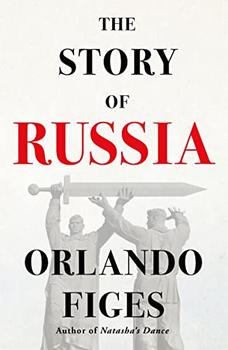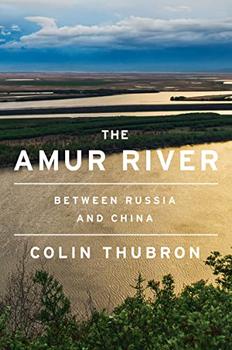Summary | Excerpt | Reviews | Beyond the book | Read-Alikes | Genres & Themes | Author Bio

In The Story of Russia, British historian and writer Orlando Figes shares panoramic and authoritative insight into the heritage of this vast and complex country. Figes posits the theory that an understanding of Russia's past is crucial if one is to unpack the logic of contemporary politics and access the mindset of ruling elites: "Contemporary Russian politics are too often analyzed without knowledge of the country's past."
Traveling back to the foundation of the state of Rus in the ninth century, Figes leads his readers on a revelatory journey that terminates with Russia's expansion of its invasion into Ukraine in February of 2022. This sweeping chronology is comprised of numerous micro-stories, stretching from the days of the commonwealth-style Kievan Rus to Putin's exploitation of history to achieve his own vision of Russia. Figes shows how recorded events are open to reimagined versions of history, that they can be molded to legitimize the ruling ideology of the day and shape collective memory, thus blurring the boundaries between mythology and historical fact.
This disingenuous tendency to hijack history to suit purpose is clearly illustrated in the opening pages of The Story of Russia. Figes prefaces his narrative by recalling the unveiling of a memorial to Vladimir the Great — known for expanding the Kingdom of Kievan Rus — in Moscow on November 4, 2016. The date coincided with National Unity Day, a holiday celebrating patriotism, which served to promote the leader's quest for a wider Russia. For Putin, the statue — only the latest in a salvo of iconic monuments springing up around the country — is emblematic of Russia's revised past, and is a counterpoint to an existing monument of Volodymyr the Great (as he is known in Ukraine) overlooking the River Dnipro in Kiev. The Moscow version of Vladimir, Figes informs us, is taller and more imposing than its Kiev counterpart, promoting Russia's self-image as a country that is robust and founded on the strength of paternalistic leadership. Reading between the lines, the monument could be a metaphor for Putin himself, although Figes does not go so far as to say this directly. Ukrainians claim this legendary figure, who ruled Kiev from 980 to 1015. The Moscow statue, Figes explains, is the latest attempt by Russia to take advantage of its history of fluid borders and signal to its people that all former Russian states belong under the national yoke.
The warring narratives of Vladimir versus Volodymyr convey the covetous flavor of current politics. From this standpoint, details of Russia's history unfold and illuminate recent events. Figes expounds these events in remarkable detail, demonstrating an astonishing breadth of knowledge and scholarship. He crams his narrative with a glut of specifics and lesser-known facts. For this reason, even aficionados of Russian history are likely to learn something new from this book.
For the lay reader, The Story of Russia provides an informative historical overview, written in straightforward, measured prose. The scale of Figes' account means that it can be used as a springboard for more in-depth study of a discrete topic — for example, further reading about Ivan IV (better known in the West as Ivan the Terrible) may be triggered by a desire to learn more about Putin's motivations. Despite the book's merits, the sheer volume of detail that is jam-packed into it can seem a little intense and difficult to absorb, especially as some may find Figes' style on the dry side. A more novelistic exposition would have perhaps helped flesh out the "characters" and lent more engagement to the storytelling.
Reflecting on the book as a whole, three motifs of Russia's unique identity emerge. Firstly, fluid borders have always rendered the country vulnerable to attack (the Mongol invasion is an early example of this), mitigating both the aggression and defensiveness of its rulers; secondly, religion and rulership are historically mortgaged together, making any attack on the nation's leader seemingly heretical; and thirdly, the prevalence of autocratic rule, whereby the ruler is imbued with both spiritual and paternalistic power. What Figes provides is the minutiae surrounding these themes, knitted into a coherent "story," making this book an invaluable read for anyone interested in the foundations of modern Russia.
![]() This review was originally published in The BookBrowse Review in September 2022, and has been updated for the
September 2023 edition.
Click here to go to this issue.
This review was originally published in The BookBrowse Review in September 2022, and has been updated for the
September 2023 edition.
Click here to go to this issue.

If you liked The Story of Russia, try these:

by Alexei Navalny
Published 2024
The powerful and moving memoir of a fearless political opposition leader who paid the ultimate price for his beliefs.

by Colin Thubron
Published 2022
The most admired travel writer of our time - author of Shadow of the Silk Road and To a Mountain in Tibet - recounts an eye-opening, often perilous journey along a little known Far East Asian river that for over a thousand miles forms the highly contested border between Russia and China.




The less we know, the longer our explanations.
Click Here to find out who said this, as well as discovering other famous literary quotes!
Your guide toexceptional books
BookBrowse seeks out and recommends the best in contemporary fiction and nonfiction—books that not only engage and entertain but also deepen our understanding of ourselves and the world around us.